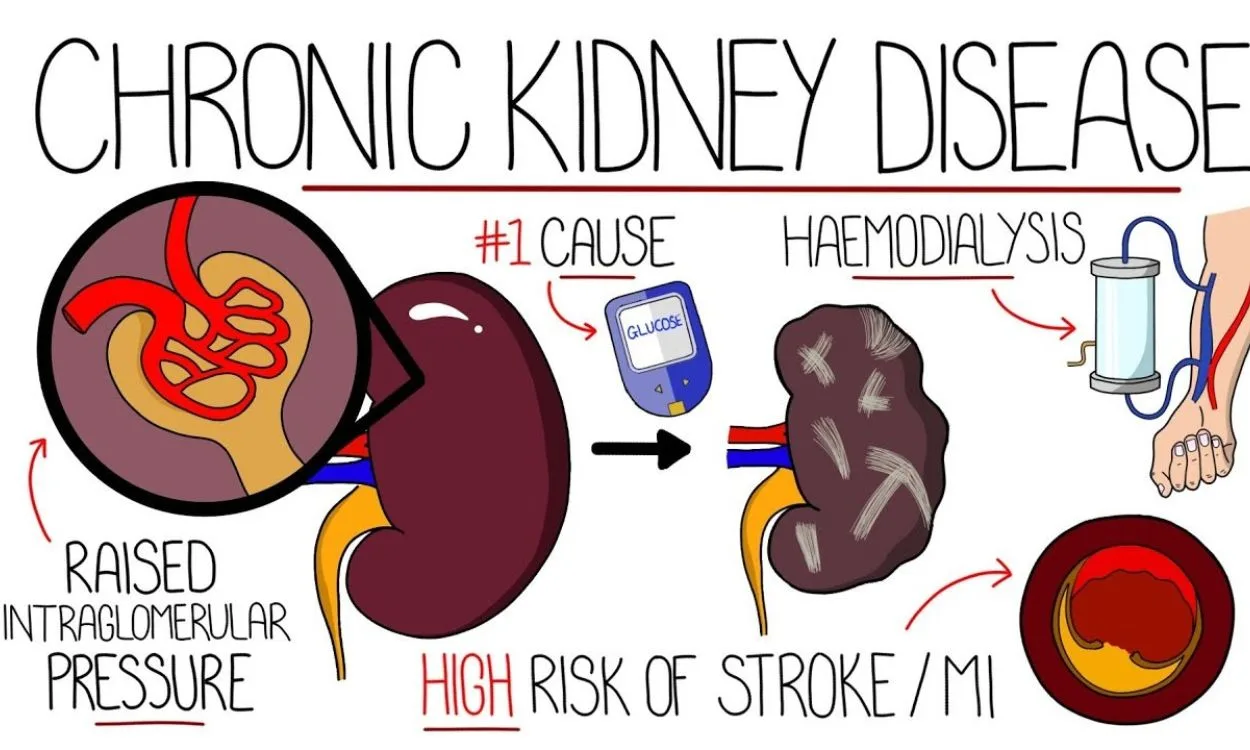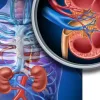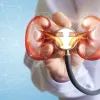What is Chronic Kidney Disease (CKD)?
Chronic Kidney Disease (CKD) is a condition characterized by the gradual loss of kidney function over time. The kidneys play a crucial role in filtering waste products, excess fluids, and toxins from the blood, as well as regulating the body’s electrolyte balance and blood pressure. When the kidneys are damaged and cannot perform these functions adequately, CKD develops.
Causes of Chronic Kidney Disease
CKD can be caused by various factors, including:
- Diabetes: Uncontrolled diabetes can damage the blood vessels in the kidneys, leading to CKD.
- High blood pressure: Persistently high blood pressure can strain the blood vessels in the kidneys, impairing their function.
- Glomerulonephritis: This is a condition where the tiny filtering units in the kidneys, called glomeruli, become inflamed and damaged.
- Polycystic kidney disease (PKD): PKD is an inherited condition characterized by the growth of cysts in the kidneys, which can eventually lead to CKD.
- Urinary tract obstructions: Blockages in the urinary tract, such as kidney stones or an enlarged prostate, can cause CKD if left untreated.
- Other conditions: Certain autoimmune diseases, infections, and drug toxicity can also contribute to the development of CKD.
Stages of Chronic Kidney Disease
CKD is classified into five stages based on the estimated glomerular filtration rate (eGFR), which measures the kidney’s ability to filter waste products. These stages indicate the progression of the disease, with stage 1 being the mildest and stage 5 being end-stage renal disease (ESRD) requiring dialysis or a kidney transplant.
- Stage 1: eGFR >90 mL/min/1.73m² – kidney damage with normal or slightly increased filtration rate.
- Stage 2: eGFR 60-89 mL/min/1.73m² – mild decrease in filtration rate.
- Stage 3: eGFR 30-59 mL/min/1.73m² – moderate decrease in filtration rate.
- Stage 4: eGFR 15-29 mL/min/1.73m² – severe decrease in filtration rate.
- Stage 5: eGFR <15 mL/min/1.73m² – kidney failure requiring dialysis or transplant.
Symptoms of Chronic Kidney Disease
In the early stages, CKD may not cause any noticeable symptoms. As the disease progresses, the following symptoms may occur:
- Fatigue and weakness
- Swelling in the legs, ankles, feet, or face
- Shortness of breath
- Changes in urine frequency and volume
- Blood in urine
- High blood pressure
- Nausea and vomiting
- Loss of appetite
- Muscle cramps
- Itchy skin
- Trouble concentrating
Diagnosis and Treatment Options
To diagnose CKD, healthcare providers may perform blood tests to measure kidney function, urine tests to check for protein and other abnormalities, and imaging tests to evaluate the structure of the kidneys.
Treatment for CKD aims to slow down the progression of the disease, manage symptoms, and prevent complications. The following treatment options may be recommended:
- Lifestyle changes: Adopting a healthy lifestyle, including regular exercise, maintaining a balanced diet, limiting salt and protein intake, and quitting smoking.
- Medications: Medications may be prescribed to control underlying conditions such as high blood pressure and diabetes. Additional medications may be prescribed to manage symptoms and complications of CKD.
- Dialysis: In advanced stages of CKD, when the kidneys are no longer able to effectively filter waste products and excess fluids from the body, dialysis may be necessary. Dialysis is a medical procedure that filters the blood using a machine.
- Kidney transplant: In some cases, a kidney transplant may be recommended as a treatment option for end-stage renal disease. This involves surgically replacing the diseased kidney with a healthy one from a donor.
How Fitpaa Can Help
While CKD is a complex medical condition that requires ongoing monitoring and management, Fitpaa can assist individuals in achieving their health and fitness goals, even with CKD. Fitpaa’s personalized approach, combining medical therapy, exercise therapy, and nutrition therapy, can be tailored to suit the needs of individuals with CKD. The Fitpaa Capsule, designed by a team of experts, can help optimize metabolism, promote overall health, and support the management of CKD alongside medical treatment.
With the Fitpaa app, individuals can easily track their progress, access workout videos, follow a personalized diet plan, and receive real-time guidance to stay motivated and achieve their health and fitness goals. Fitpaa’s team of fitness planners, nutritionists, trainers, and doctors will provide unlimited consultations, regular follow-ups, and reviews to ensure individuals with CKD stay on track and make necessary adjustments to their Fitpaa Capsule.
Fitpaa’s commitment to helping individuals lead a healthy and fulfilling life extends to those with chronic kidney disease. By incorporating the principles of lifestyle medicine and behavioral therapy, Fitpaa aims to empower individuals to manage their CKD effectively and improve their overall well-being.
To experience the benefits of Fitpaa and start your journey towards a healthier life, download the Fitpaa app today and request a trial. Remember, with Fitpaa, nothing is impossible when it comes to achieving your health and fitness goals. Your well-being is our mission!









